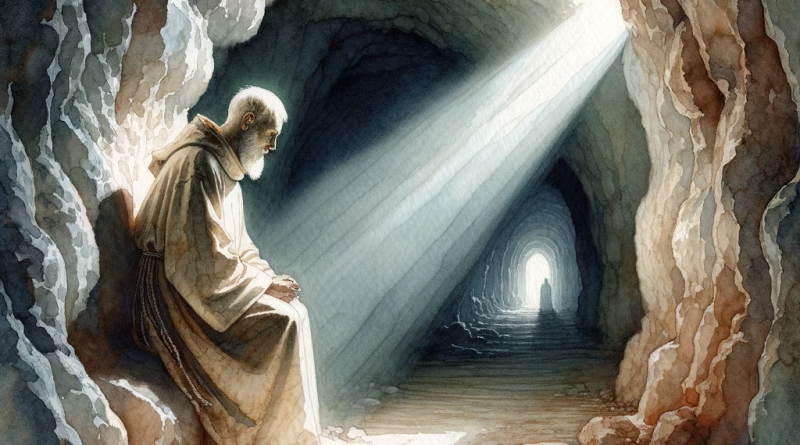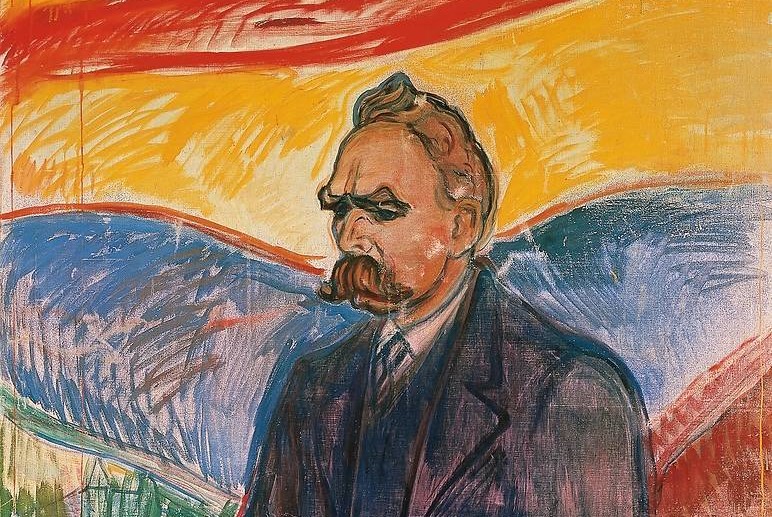St Augustine: Good, Evil, and the Order of the Universe
Augustine of Hippo, born in 354 CE in present-day Algeria, is a towering figure in Western philosophy. His writings, shaped by the chaotic collapse of the Western Roman Empire, grappled with profound existential questions. His era was one of dramatic transition, filled with political upheaval, intellectual revival, and religious transformation.
One of Augustine’s most profound concerns was the nature of good and evil, a theme that has vexed philosophers, theologians, and thinkers for centuries. How can we reconcile the existence of a benevolent and all-powerful Creator with the presence of evil in the world? Why do bad things happen to good people? These questions are not mere philosophical musings but are deeply rooted in the human experience.
Augustine’s approach to these questions was methodical, clear, and grounded in his Christian faith. Unlike the dualistic view of some thinkers like Manichaeism, where good and evil are seen as opposing forces, Augustine saw evil as a lack or absence of good. It’s not an independent substance but a deviation from what is intended by a wholly Good Creator.
This idea contrasts sharply with the thought of Plato, who lived nearly four centuries before Augustine. Plato envisioned a world where physical objects are imperfect copies of perfect Forms or Ideas. In this view, evil could be seen as the imperfection in those copies.
But Augustine, heavily influenced by his Christian beliefs, proposed a different vision. Goodness comes from God, the source of all creation, and evil is a distortion of that goodness. This implies that evil, in both a moral and metaphysical sense, is not a thing in itself but a disorder in the universe.
Within this framework, Augustine also wrestled with human agency, free will, and moral responsibility. How can we have free will if God knows everything that will happen? How are we responsible for our actions if they are preordained? These questions lead to complex debates within Augustine’s works and his interactions with other thinkers like Pelagius, who challenged Augustine’s ideas on original sin and divine grace.
The philosophical implications of Augustine’s approach to good, evil, free will, and the universe’s order are vast. It forms a comprehensive system that attempts to explain not only the world around us but the very nature of our existence. As we progress through this exploration, we will see how these ideas interact, how they have been challenged, and how they continue to influence our understanding of these timeless concepts.
While many of these ideas may seem distant from our daily lives, they are at the very core of how we perceive right and wrong, how we make choices, and how we understand our place in the world. Augustine’s reflections on these matters offer not just an intellectual exercise but insights into the human condition that remain as relevant today as they were in the fading days of the Roman Empire.
Part 1: Augustine’s Conception of the Good and Creation
1.1 The Good as Divine
Augustine’s idea that goodness is inseparably tied to the divine marks a crucial perspective within his philosophy. According to him, every created being inherently possesses goodness, simply by being a creation of a wholly Good Creator. This concept, woven into Christian doctrine, differs sharply from earlier Greek philosophies, such as Aristotle’s ethical system, where goodness is an end in itself, not necessarily connected to a divine being.
Augustine’s association of all goodness with God carries significant implications for understanding evil, which he sees not as a substance but a deprivation or absence of good. The existence of evil, then, is not a contradiction to a benevolent God but a departure from the intended goodness. However, critics of this view may question how evil can exist in a creation made by a perfect God, leading to Augustine’s reflections on the order within creation.
1.2 Creation’s Order
The universe, in Augustine’s eyes, is created with an inherent order that mirrors divine wisdom. While this order may not always be visible or comprehensible to human minds, it still guides the structure of existence.
This perspective aligns with certain Stoic principles, where everything is part of an interconnected system ruled by universal reason. Yet Augustine’s view diverges from Stoicism by attributing this order to a personal God rather than an impersonal force.
In this conception, even what seems chaotic or unjust may have its place in a broader design, fulfilling a purpose that serves the overall good. Such a view helps address criticisms regarding the presence of imperfections or evils within creation. The existence of a divinely guided order can reconcile the notion of a perfect God with an apparently imperfect world.
However, not everyone might be satisfied with this explanation. Some may argue that this perspective evades the real issue of God’s responsibility for the world’s imperfections and suffering, seeing Augustine’s theory as a too-convenient justification for a benevolent Creator without fully engaging with the complexities of evil and human suffering.
Reflection
Augustine’s thoughts on the Good as Divine and Creation’s Order form the foundation of his philosophical system, rich in nuance and depth. They provide a way to comprehend the intricate balance of good and evil in our world, linking them to a higher divine purpose. But these ideas also provoke challenging questions that have spurred debate for centuries. As we delve further into Augustine’s philosophies, we’ll see how his understanding of these concepts continues to shape and inspire discussions on morality, existence, and the nature of our universe. His legacy endures, challenging us to look beyond the surface of our world and to reflect on the fundamental principles that govern our lives.
Part 2: Metaphysical Evil as Disorder in the Universe
2.1 Definition of Metaphysical Evil
Augustine’s philosophy diverges from many other thinkers of his time by framing metaphysical evil not as an actual substance but as a privation or absence of good. This concept of evil as non-being means that evil is not something created by God but rather a distortion or lack of something that ought to be there.
In contrast to dualistic systems like Manichaeism, which see good and evil as equal and opposing forces, Augustine’s Christian perspective places evil as subordinate to good. Evil doesn’t exist in its own right; it is a corruption of the good. This can be likened to darkness, which doesn’t exist on its own but is merely the absence of light.
2.2 Disorder and Deviation
To further clarify this idea, Augustine employs examples of how evil arises from deviations from the natural order. Consider the human body: If all parts work as they should, the body is healthy. But if one part deviates from its proper function, like an infection in the eye, it leads to disorder and suffering. This infection is not evil in itself but becomes so due to its deviation from its proper place and function.
Similarly, Augustine sees moral wrongdoings as instances of human will deviating from the rational order. If our actions align with reason and divine law, they are good. But when they deviate, they lead to disorder, just like the infected eye.
2.3 Counterarguments
Augustine’s concept of metaphysical evil was not without critics. Some found it difficult to reconcile with the apparent realities of pain, suffering, and wickedness in the world. If evil is merely a lack or absence, how can it have such potent and tangible effects?
In response, Augustine emphasized that while evil is not a substance, it is still a real and potent force as a distortion or corruption of good. He likened it to a wound in the body, which, although an absence (a gap in the flesh), has painful and real effects.
Some critics also found his conception of evil too passive, not adequately accounting for active malevolence. Augustine addressed this by tying the concept of evil to free will, where human choices lead to these deviations from the good. Even so, the critics might argue, this doesn’t fully explain why a perfect God would allow for the possibility of such deviations.
Reflection
Augustine’s unique perspective on metaphysical evil as disorder and deviation from the natural order provided a significant shift in understanding the nature of evil. By defining evil as a lack or absence of good rather than a substance, he underscored a dynamic relationship between good and evil, where the latter is entirely dependent on the former.
However, this perspective also opened up complex questions and was not without its detractors. While Augustine’s philosophy offers robust responses to these challenges, the issues raised continue to provoke thought and debate. His ideas, deeply rooted in Christian theology, not only have shaped religious thought but also continue to resonate in modern philosophical discourse. His approach to metaphysical evil prompts us to reflect on the very nature of existence and the human condition, challenging us to seek a deeper understanding of our place in the universe and the moral choices that define our lives.
Part 3: Moral Evil, Free Will, and Human Agency
3.1 The Human Will
For Augustine, the key to understanding moral evil lies in the free will of human beings. He asserts that humans are endowed with the ability to make choices, and it is through these choices that evil enters the world. Free will is not merely the ability to choose between right and wrong but also involves the pursuit of wisdom and the alignment with divine order.
But what happens when we choose wrongly? Augustine argues that when we make choices that diverge from divine goodness and reason, we give birth to moral evil. These choices are not forced upon us but stem from our own inclinations and desires. An example might be a person stealing to satisfy greed, even knowing it is wrong. In doing so, they misuse their free will and create moral evil.
3.2 The Paradox of Evil Choices
One of the most perplexing questions in Augustine’s philosophy is how evil choices can exist within the framework of a wholly Good Creator. If God is all-knowing, all-powerful, and entirely good, how can there be room for evil?
Augustine’s response to this paradox is to insist that evil choices are not created by God but arise from human free will. He emphasizes that free will is a gift from God and, as such, is inherently good. But, like many gifts, it can be misused.
Consider the ability to speak: It can be used to convey love, wisdom, and truth or to lie, deceive, and spread hatred. The ability itself is neutral but becomes good or evil depending on how it’s used. This also explains why not everyone makes evil choices; the potential is there, but the decision lies with the individual.
3.3 Counterarguments
Augustine’s view on free will and moral evil wasn’t universally accepted, even within Christian thought. Some theologians like Pelagius argued for a more robust sense of human autonomy, where grace was not necessary for virtuous action. Others, like Calvin, emphasized God’s sovereignty to such an extent that human free will became negligible.
Comparing to the Stoic tradition, where everything is governed by fate and the cosmic order, Augustine’s emphasis on free will seems almost radical. Stoics would argue that our characters and decisions are shaped by nature and the cosmos, leaving little room for genuine free choice.
Augustine’s response to these objections was firm: Free will is essential for moral responsibility, and without it, concepts like virtue, sin, reward, and punishment become meaningless. It is this balance of divine sovereignty and human agency that defines his understanding of moral evil.
Reflection
Augustine’s exploration of moral evil, free will, and human agency is as intricate as it is profound. His insistence that evil choices stem from the misuse of free will, coupled with his nuanced understanding of the relationship between divine sovereignty and human agency, creates a rich and complex picture of human nature and morality.
While Augustine’s answers to the paradox of evil choices and his understanding of the human will have been the subject of critique, debate, and reinterpretation throughout history, they continue to influence contemporary discussions on free will, ethics, and the nature of evil.
His thoughts resonate not only in philosophical and theological circles but also in our everyday lives, where choices, responsibilities, and the consequences of our actions continue to challenge and shape our moral landscape. Whether one agrees with Augustine’s particular viewpoint or not, his insights into the human condition and the questions he grapples with are eternally relevant, inviting us to reflect on the choices we make and the values that guide us.
Conclusion: A Harmonious Picture of Good and Evil
4.1 Synthesizing the Main Points
Augustine’s view of good and evil is complex, multifaceted, yet ultimately harmonious. By examining his thoughts on the Good as Divine, Creation’s Order, Metaphysical Evil, and Moral Evil, a comprehensive picture emerges that intertwines these elements in a way that allows for a meaningful understanding of the universe.
The belief that all creation reflects divine wisdom and inherent order provides the foundation for Augustine’s worldview. From this perspective, goodness is not an abstract concept but permeates the very fabric of existence. Metaphysical evil, then, is seen not as a force in its own right but as a deviation from this goodness, a lack of being.
But it is in the realm of human agency and free will where Augustine’s philosophy truly shines. Moral evil arises from the misuse of the human will, leading to choices that depart from the divine order. This intricate relationship between the human will, divine sovereignty, and moral evil allows Augustine to address age-old questions about responsibility, virtue, and sin in a way that resonates with our own experiences and struggles.
4.2 Reflecting on Contemporary Relevance
Augustine’s ideas continue to be relevant in contemporary discussions on morality, choice, and societal order. The tensions between individual autonomy, moral responsibility, and societal expectations echo in our own time, as we grapple with issues ranging from ethical dilemmas in technology to social justice and governance.
Some philosophers, such as Alasdair MacIntyre, have drawn on Augustine’s insights to critique modern moral theories, highlighting the need for a more cohesive ethical framework. Similarly, debates about determinism and free will in the fields of neuroscience and psychology often resonate with the tensions that Augustine sought to reconcile.
In a society where choices abound and moral lines can seem blurred, Augustine’s emphasis on internal reflection, personal responsibility, and alignment with a higher order continues to offer a significant perspective. His understanding of good and evil provides a lens through which we can assess our own actions, motivations, and the broader societal structures that influence them.
Reflection
In bringing together the multifaceted aspects of good, evil, free will, and cosmic order, Augustine offers a rich and nuanced philosophical landscape that speaks not only to his own time but also to ours. His ability to address profound and perplexing questions in a manner that is both insightful and accessible ensures that his ideas remain a vital part of philosophical discourse and human self-understanding.
Through the examination of Augustine’s thoughts, we are invited to reflect on our own beliefs, choices, and the ways in which we navigate the complexities of life. The harmonious picture he paints provides a timeless guide, shedding light on our ongoing quest for meaning, virtue, and the delicate balance between individual freedom and societal order. Whether one is steeped in philosophical inquiry or simply seeking to understand the world, Augustine’s vision of good and evil continues to engage, challenge, and inspire.



